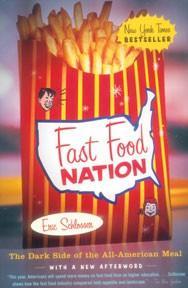LSU Ambassadors sat amid a hodgepodge of cardboard boxes, University pamphlets and 1,725 copies of a particular book Monday with a goal for the mess of paper products — making the Flagship Agenda real to students.
The boxes, pamphlets and book — Eric Schlosser’s “Fast Food Nation” — all were stuffed into LSU Bookstore bags to be given to high school seniors converging on campus for Spring Testing.
These students will have the opportunity to become integral players in the Flagship Agenda by participating in the University’s first Summer Reading Program.
“Fast Food Nation” will be recommended — but not required — reading for incoming freshmen for the fall 2004 semester.
Proponents of the Flagship Agenda hope recommended summer reading will play into the agenda’s goal of creating a more academically-focused campus.
The reading program’s goals include facilitating discussions among freshmen and giving incoming freshmen personal contact with faculty members before classes even start — something Flagship proponents and freshmen have said does not often happen.
The National Survey of Student Engagement administered a survey for freshmen at several universities during the 2002-2003 academic year to measure their perceptions of four qualities about their educations. Those qualities included level of academic challenge, active and collaborative learning, student-faculty interaction and enriching educational experiences.
NSSE compared LSU freshmen’s answers to the answers of freshmen at comparable state universities including the University of North Carolina at Chapel Hill, Georgia Tech and the University of Texas. The other universities were put in the same category as LSU because they all graduate a similar number of doctoral students each year.
Each university’s survey answers were then put in percentile-ranked form.
LSU freshmen ranked their level of academic challenge at 14 percent. This means that 86 out of 100 students rank their university’s academic challenge better than LSU’s.
Active and collaborative learning at LSU ranked 22 percent, student-faculty interaction 9 percent, and enriching educational experiences 31 percent.
Bill Matthews, director of the LSU Center for Assessment and Evaluation, has analyzed LSU’s NSSE results. He said there is no specific “summer reading” category on the NSSE survey, but summer reading could help improve freshmen’s perspectives in the four surveyed categories.
“Score is not the important thing to improve, but the academic standing is,” Matthews said.
Provost Risa Palm views summer reading — and more broadly the Flagship Agenda — as an enhancement to LSU’s tradition.
Palm wants LSU freshmen’s experiences to be more than just big classes. She wants freshmen to have more interaction with faculty.
“The idea is in a big, research university, freshmen can get lost and get oriented in a way that is dysfunctional,” Palm said. “Freshmen have a need to feel known by faculty.”
Upperclassmen who have gotten into their concentrated courses, Palm said, often have the faculty-student connection many freshmen lack.
Sarah Liggett, an English professor, also supports the Summer Reading Program. Liggett hopes professors for freshmen from various disciplines — including English, political science and economics — will use the book for teaching and discussing in their classrooms.
One reason “Fast Food Nation” was chosen, Liggett said, is that it is “controversial.” But, it was not chosen simply to cause trouble.
“I think it leads to the best discussion when you can look at different sides of an issue,” Liggett said.
“Fast Food Nation” includes the phrase “The Dark Side of the All-American Meal” on its cover. Liggett said the book was not chosen because of any bias against the food industry and people should challenge the book after they read it.
“Just because there’s a dark side to the All-American Meal doesn’t mean there’s not a bright side,” she said. “What was left out?”
Liggett said as far as she knows, the 1,175 copies of “Fast Food Nation” LSU Ambassadors stuffed in sacks Monday were paid for by private funds — not money paid by LSU students. She said Chancellor Mark Emmert would be the best person to consult about the cost.
Emmert could not be reached by press time Monday for comment.
Reading on the Agenda
March 23, 2004

Reading on the Agenda



